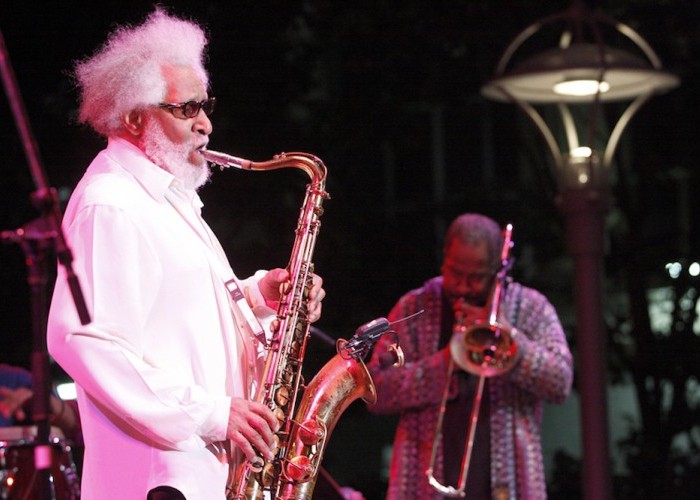Jan 13, 2026 2:09 PM
More Trump-Kennedy Center Cancellations
The fallout from the renaming of the John F. Kennedy Center for the Performing Arts to include President Donald…

Sonny Rollins performs at the 2012 Detroit Jazz Festival.
(Photo: Courtesy Detroit Jazz Festival)Robert McCabe, founder of the Montreux-Detroit International Jazz Festival—known since 2011 as the Detroit Jazz Festival—always harbored major aspirations for the four-day event.
McCabe arrived in Detroit in 1971 to run the organization Detroit Renaissance and to revitalize the city’s economy. After completion of the Renaissance Center building project, the city’s then-mayor, Coleman A. Young, asked McCabe to put together a free jazz festival.
McCabe died in 2013 at age 86, but lived long enough to see the festival become an enormous event, drawing hundreds of thousands of fans to Detroit’s Hart Plaza every Labor Day weekend.
“Bob’s vision from the beginning was that the festival could become one of the great jazz festivals in the world—one that could eventually grow to be globally significant,” said saxophonist Chris Collins, the festival’s artistic director.
The event’s 40th edition, which runs Aug. 30–Sept. 2, will feature bassist Stanley Clarke as its artist-in-residence. Other superstars in the lineup include guitarist Pat Metheny, bassist Ron Carter, saxophonists Kenny Garrett and Joe Lovano, trumpeter Terence Blanchard, vocalist Dee Dee Bridgewater, pianist Chucho Valdés and the quartet Yellowjackets with guest vocalist Luciana Souza. (A complete schedule is posted at the festival’s website.)
Back in 1979, McCabe, modeling the event after the Montreux International Jazz Festival in Switzerland, established an exchange program wherein U.S. high school jazz bands would perform in Switzerland. He also booked the greats—Oscar Peterson, Clark Terry and the Heath Brothers—and staged several fundraising concerts.
The festival’s history is packed with unforgettable moments, like the night in 1996 when saxophonists James Carter and Dave Murray blew toe-to-toe in a cutting contest, the 2012 evening when Sonny Rollins had fans dancing in the aisles or the night Nancy Wilson sang so angelically that listeners wept.
Over the years, many musicians have experienced unforgettable moments as well. Pianist Danilo Pérez recalled being onstage in 2009 with the Wayne Shorter Quartet: “At that moment, the message of connection and people connecting to the music—it became literal, to feel the energy in the air as we took the music into unknown territories.”
The festival has overcome plenty of challenges to get where it is today, though. In 1999, the Montreux festival pulled the use of its name, and the event eventually was renamed the Ford Detroit International Jazz Festival. And the fest would go on to experience some shaky ground after Ford Motor Co. discontinued its sponsorship.
Gretchen Valade, owner of Mack Avenue Records, reportedly set up a $15 million endowment for the festival in 2005–’06, a time when the event was struggling financially. Her philanthropic efforts continue to support the festival, but there also has been corporate support from companies like Quicken Loans, which again is the festival’s presenting sponsor.
“I love jazz and I love Detroit,” Valade said. “The preservation of the Detroit Jazz Festival and the establishment of an endowment not only preserved Detroit’s status as a global jazz epicenter, but also supported a societal and cultural mission to the world’s largest free jazz festival as an inspiration for the next generation.”
Its programming has remained world-class largely due to the work of its artistic directors over the years: Joyce Cusmano, Jim Dulzo, Frank Malfitano, Terri Pontremoli and Chris Collins. Dulzo (1994–2000), for example, presented swing, bop, blues, the avant-garde and even gospel. Malfitano (2000–’05) expanded the festival to Campus Martius Park, added two stages and instituted the artist-in-residence program, which has included such big names as Metheny, Blanchard, Wayne Shorter and Chick Corea.
“One of the things I like about the program is that the festival has musicians in the community, in the schools,” said violinist Regina Carter, the festival’s first artist-in-residence. “Not only do the festivalgoers and students get to see the musicians in a different configuration, but these younger musicians interact with them. That’s such an important role for the festival.”
Under Pontremoli (2005–’11) and Collins (2011–present), the festival became globally renowned as both pushed themselves to think outside the box, commissioning musicians such as Shorter, Christian McBride and John Clayton to write compositions and develop projects specifically for the festival.
“The festival has a strong footing,” Collins said. “Along the way, there have been these different caretakers making the best use of the resources to keep the festival going.” DB

Belá Fleck during an interview with Fredrika Whitfield on CNN.
Jan 13, 2026 2:09 PM
The fallout from the renaming of the John F. Kennedy Center for the Performing Arts to include President Donald…

Peplowski first came to prominence in legacy swing bands, including the final iteration of the Benny Goodman Orchestra, before beginning a solo career in the late 1980s.
Feb 3, 2026 12:10 AM
Ken Peplowski, a clarinetist and tenor saxophonist who straddled the worlds of traditional and modern jazz, died Feb. 2…

The success of Oregon’s first album, 1971’s Music Of Another Present Era, allowed Towner to establish a solo career.
Jan 19, 2026 5:02 PM
Ralph Towner, a guitarist and composer who blended multiple genres, including jazz — and throughout them all remained…

Rico’s Anti-Microbial Instrument Swab
Jan 19, 2026 2:48 PM
With this year’s NAMM Show right around the corner, we can look forward to plenty of new and innovative instruments…

Richie Beirach was particularly renowned for his approach to chromatic harmony, which he used to improvise reharmonizations of originals and standards.
Jan 27, 2026 11:19 AM
Richie Beirach, a pianist and composer who channeled a knowledge of modern classical music into his jazz practice,…